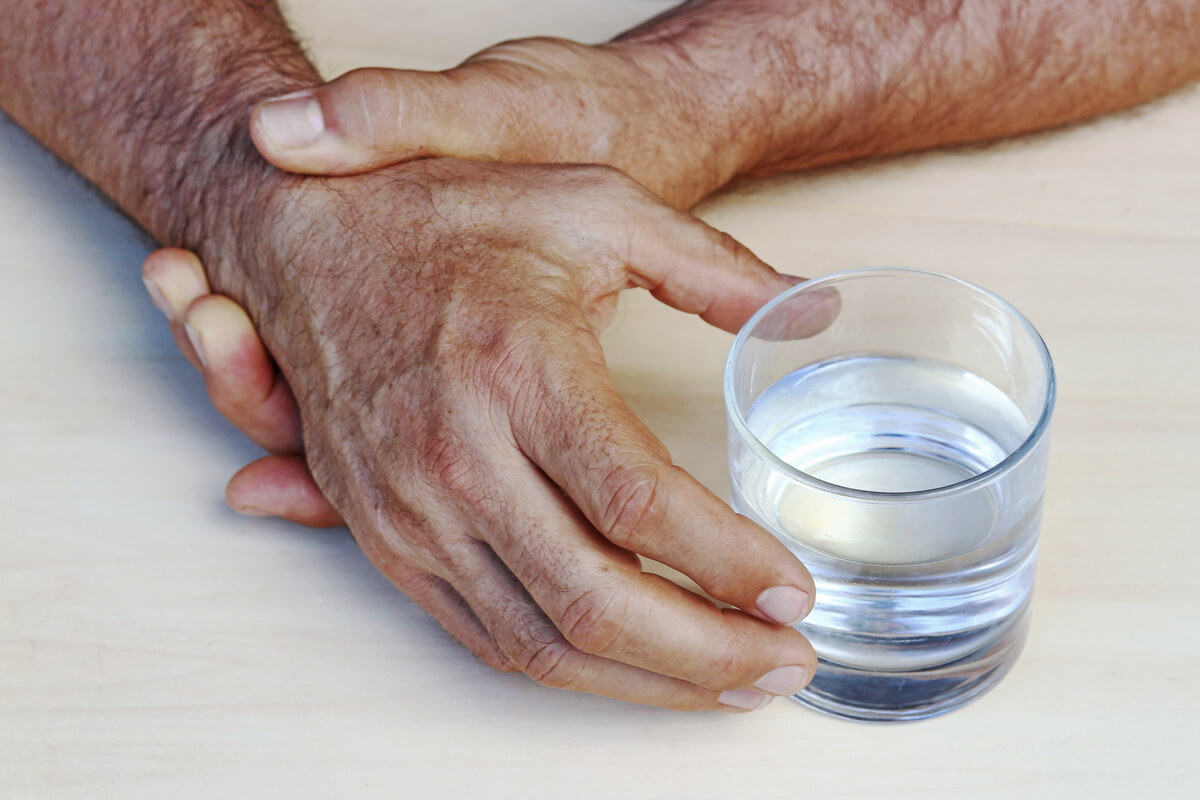What Is Serotonin Syndrome?

Serotonin syndrome is a medical emergency that can put a person’s life is at risk. Thankfully, it isn’t a common health problem. It usually occurs by taking several medications that increase serotonin levels in the body, such as medications for migraines or antidepressants.
Serotonin (also known as 5-hydroxytryptamine ) is a hormone found in the brain, platelets, digestive tract, and pineal gland. It also acts as a neurotransmitter and vasoconstrictor. And, as scientific evidence points out, the lack of it has often been associated with depression.
If there’s any type of imbalance in our bodies, then several types of health problems can arise. Thus, both the excess and the lack of a hormone such as serotonin can be harmful.
According to a study on the subject, serotonin syndrome can be defined as follows: ‘a set of signs and symptoms attributed to excessive activity of serotonergic neurotransmission in the central and peripheral nervous system’. Now, what symptoms does this produce? Let’s take a look.
Symptoms

Although some symptoms may vary from person to person, in general, serotonin syndrome can cause the following:
- Diarrhea
- Vomiting
- Confusion
- Shaking chills
- Tremors
- Tachycardia
- Arterial hypertension
- Muscle contractions
- Alarming restlessness, anxiety and delirium
- Difficulty maintaining balance
- Myoclonus (sudden and involuntary spasms)
- Hyperreflexia (very intense musculoskeletal reflexes after stimulation)
- Hypertonia or muscle stiffness (especially in the lower extremities)
- Hyperthermia (increased body temperature)
- Diaphoresis (increased sweating).
The intensity of the symptoms will also depend on each person. However, in all cases, medical attention is required, especially when the person has a fever, high blood pressure, tachycardia, hyperreflexia, myoclonus, and dilated pupils.
Serotonin syndrome has a rapid onset, usually occurring within 24 hours of taking the drugs. It’s characterized by causing hyperreflexia, which helps differentiate it from neuroleptic syndrome.
Causes
As we mentioned at the beginning, serotonin syndrome is usually caused by the consumption of a cocktail of medications (at least 2), mainly drugs for migraine (valproic acid, triptans and dihydroergotamine) and antidepressants.
However, it can also be caused by increasing the dose of a single serotonergic drug or by an overdose of the same.
Diagnosis
The diagnosis is clinical, which means that it’s made based on the symptoms that the person shows. There’s no specific diagnostic test for this syndrome. However, there are certain steps that can help:
- Complete blood test
- Elevated creatine phosphokinase
- Basic metabolic panel
- Urine analysis
- Others (according to what the doctor considers)
Treatment

Treatment of serotonin syndrome is symptomatic. When it’s applied early, the patient’s prognosis is good. Hence the importance of calling the emergency services when the person begins to manifest the symptoms already mentioned above.
As the MSD Manual indicates, treatment includes the following:
- Suspension of all serotonergic drugs
- Benzodiazepines, when the symptoms aren’t severe
In mild cases, the patient is usually kept under observation for a few hours (usually 24-72 hours).
In severe cases, the patient must be admitted to the intensive care unit until stabilization is achieved. The process may include the following:
- Oxygen therapy
- Continuous monitoring of the heart
- Sedation (for neuromuscular blockade)
- Administration of fluids (intravenously)
- Treatment for hyperthermia (cooling)
- Pharmacological treatment of autonomic abnormalities that occur
When symptoms persist despite symptomatic treatment already having been administered, the use of the serotonin antagonist cyproheptadine (orally or by nasogastric tube) is considered.
Prevention
To prevent serotonin syndrome, we recommend avoiding self-medication, and not increasing or lowering the doses of the drugs taken without the doctor’s authorization. Of course, you should always keep them informed about each and every one of the medications and supplements you take.
In the event of some type of herbal supplement or natural remedy having been consumed, it’s also important to discuss it in consultation, because although these are not directly related to the appearance of the syndrome, they can affect interactions.
If you’re taking medications for migraines or depression, be sure to always follow the recommendations that the specialist gives you. And, if you have any questions or don’t feel well, don’t ignore it and go for a consultation.
Serotonin syndrome is a medical emergency that can put a person’s life is at risk. Thankfully, it isn’t a common health problem. It usually occurs by taking several medications that increase serotonin levels in the body, such as medications for migraines or antidepressants.
Serotonin (also known as 5-hydroxytryptamine ) is a hormone found in the brain, platelets, digestive tract, and pineal gland. It also acts as a neurotransmitter and vasoconstrictor. And, as scientific evidence points out, the lack of it has often been associated with depression.
If there’s any type of imbalance in our bodies, then several types of health problems can arise. Thus, both the excess and the lack of a hormone such as serotonin can be harmful.
According to a study on the subject, serotonin syndrome can be defined as follows: ‘a set of signs and symptoms attributed to excessive activity of serotonergic neurotransmission in the central and peripheral nervous system’. Now, what symptoms does this produce? Let’s take a look.
Symptoms

Although some symptoms may vary from person to person, in general, serotonin syndrome can cause the following:
- Diarrhea
- Vomiting
- Confusion
- Shaking chills
- Tremors
- Tachycardia
- Arterial hypertension
- Muscle contractions
- Alarming restlessness, anxiety and delirium
- Difficulty maintaining balance
- Myoclonus (sudden and involuntary spasms)
- Hyperreflexia (very intense musculoskeletal reflexes after stimulation)
- Hypertonia or muscle stiffness (especially in the lower extremities)
- Hyperthermia (increased body temperature)
- Diaphoresis (increased sweating).
The intensity of the symptoms will also depend on each person. However, in all cases, medical attention is required, especially when the person has a fever, high blood pressure, tachycardia, hyperreflexia, myoclonus, and dilated pupils.
Serotonin syndrome has a rapid onset, usually occurring within 24 hours of taking the drugs. It’s characterized by causing hyperreflexia, which helps differentiate it from neuroleptic syndrome.
Causes
As we mentioned at the beginning, serotonin syndrome is usually caused by the consumption of a cocktail of medications (at least 2), mainly drugs for migraine (valproic acid, triptans and dihydroergotamine) and antidepressants.
However, it can also be caused by increasing the dose of a single serotonergic drug or by an overdose of the same.
Diagnosis
The diagnosis is clinical, which means that it’s made based on the symptoms that the person shows. There’s no specific diagnostic test for this syndrome. However, there are certain steps that can help:
- Complete blood test
- Elevated creatine phosphokinase
- Basic metabolic panel
- Urine analysis
- Others (according to what the doctor considers)
Treatment

Treatment of serotonin syndrome is symptomatic. When it’s applied early, the patient’s prognosis is good. Hence the importance of calling the emergency services when the person begins to manifest the symptoms already mentioned above.
As the MSD Manual indicates, treatment includes the following:
- Suspension of all serotonergic drugs
- Benzodiazepines, when the symptoms aren’t severe
In mild cases, the patient is usually kept under observation for a few hours (usually 24-72 hours).
In severe cases, the patient must be admitted to the intensive care unit until stabilization is achieved. The process may include the following:
- Oxygen therapy
- Continuous monitoring of the heart
- Sedation (for neuromuscular blockade)
- Administration of fluids (intravenously)
- Treatment for hyperthermia (cooling)
- Pharmacological treatment of autonomic abnormalities that occur
When symptoms persist despite symptomatic treatment already having been administered, the use of the serotonin antagonist cyproheptadine (orally or by nasogastric tube) is considered.
Prevention
To prevent serotonin syndrome, we recommend avoiding self-medication, and not increasing or lowering the doses of the drugs taken without the doctor’s authorization. Of course, you should always keep them informed about each and every one of the medications and supplements you take.
In the event of some type of herbal supplement or natural remedy having been consumed, it’s also important to discuss it in consultation, because although these are not directly related to the appearance of the syndrome, they can affect interactions.
If you’re taking medications for migraines or depression, be sure to always follow the recommendations that the specialist gives you. And, if you have any questions or don’t feel well, don’t ignore it and go for a consultation.
- Colomar Ferrá A, Ventayol Bosch P, Raurich JM. Síndrome serotoninérgico por interacción entre linezolid, triptófano y metoclopramida [Internet]. Vol. 33, Medicina Intensiva. Elsevier; 2009 [cited 2021 Jun 27]. p. 360–1. Available from: http://www.medintensiva.org/es-sindrome-serotoninergico-por-interaccion-entre-articulo-S0210569109000059
- Guadarrama L, Escobar A, Zhang L. Bases neuroquímicas y neuroanatómicas de la depresión. Vol. 49, Rev Fac Med UNAM. 2006.
- Tanen D. Síndrome serotoninérgico – Lesiones y envenenamientos [Internet]. Manual MSD versión para profesionales. 2019 [cited 2021 Jun 27]. Available from: https://www.msdmanuals.com/es/professional/lesiones-y-envenenamientos/enfermedades-por-calor/síndrome-serotoninérgico
- Young P., Finn B.C., Álvarez F., Verdaguer M.F., Bottaro F.J., Bruetman J.E.. Síndrome serotoninérgico: Presentación de cuatro casos y revisión de la literatura. An. Med. Interna (Madrid) [Internet]. 2008 Mar [citado 2021 Jun 27] ; 25( 3 ): 125-130. Disponible en: http://scielo.isciii.es/scielo.php?script=sci_arttext&pid=S0212-71992008000300006&lng=es.
Este texto se ofrece únicamente con propósitos informativos y no reemplaza la consulta con un profesional. Ante dudas, consulta a tu especialista.







